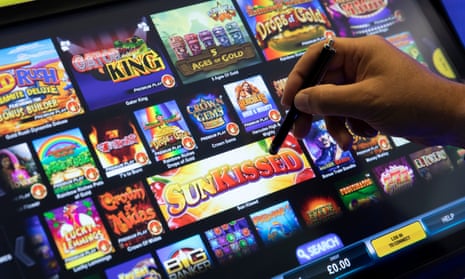MPs will this week write to the prime minister to voice concern that No 10 policy advisers with past ties to the gambling industry may be opposing tougher regulation designed to protect vulnerable people and addicts.
It comes as Guardian analysis reveals that the industry lavished £280,000 on MPs in the run-up to an overhaul of gambling laws, which were expected to be published next week.
Politicians enjoyed trips to Wimbledon, Lord’s and the Euro 2020 football tournament courtesy of the £11bn-a-year gambling industry, as well as fees for speaking engagements and salaries for second jobs.
In some cases, MPs spoke in parliament against tougher gambling restrictions on the same day they enjoyed the industry’s hospitality, or shortly afterwards.
But a letter due to be sent this week by a cross-party group of MPs led by the former Tory leader Iain Duncan Smith and the Labour MP Carolyn Harris is expected to focus on potential gambling industry influence within Downing Street.
Harris said: “It would be deeply concerning if unelected officials in No 10 with ties to gambling are now involved in making decisions about the contents of the government’s gambling white paper. Frankly the people of this country deserve better and it would bring into question all the outcomes of this review that we have already waited far too long for.”
While the Department for Digital, Culture, Media and Sport (DCMS) has drafted proposed reforms, No 10 will have the final say over whether betting logos should be banned from football shirts, as well as a proposed a mandatory levy to fund addiction research, education and treatment.
Westminster insiders said that DCMS proposals were meeting with scepticism from cabinet ministers such as Jacob Rees-Mogg but also from Boris Johnson’s parliamentary private secretary, Andrew Griffith, and his deputy chief of staff David Canzini.
Before becoming a business adviser to Johnson, and then an MP, Griffith was chief financial officer of media group Sky.
While he was in charge of the company’s finances, it sold a 20% stake in SkyBet to gambling firm The Stars Group, now part of the Flutter group that owns Paddy Power for £635m. The broadcaster also benefited from a brand licensing agreement with SkyBet and from significant advertising revenues from gambling companies.
At the end of June 2018, a year before leaving for Downing Street, Griffith held 197,580 shares in Sky and was entitled to up to 6.7m more under a long-term incentive plan.
The company was bought by US media giant Comcast in a deal worth more than £30bn later that year.
Canzini previous worked for CT Group, the lobbying and government affairs firm run by Lynton Crosby, Johnson’s election guru who recently returned to the embattled prime minster’s inner circle.
During Canzini’s time at CT Group, the company worked with betting firm Entain, which owns Ladbrokes and Coral, to create a gamblers’ advocacy group called Players’ Panel.
Its launch was beset by controversy after one of the handpicked members of the panel turned out to have posted racist and homophobic messages on Facebook.
There is no suggestion that Canzini was involved in the Players’ Panel.
Responding to the concerns, No 10 said all Griffith and Canzini’s interests were property declared, and that neither had any financial interests in the gambling industry. It said Griffith had severed all links with Sky Group on his departure in July 2019.
Duncan Smith and Harris are expected to ask No 10 to be as transparent as possible about any direct or indirect ties between advisers and gambling firms.
Separate analysis by the Guardian reveals that 38 MPs, two-thirds of them Conservatives, enjoyed £280,000 in salaries, hospitality and fees for speaking engagements in the period leading up to the gambling review.
One, Jonathan Gullis MP, read from a briefing written by Bet365 during a Westminster Hall debate earlier this year. He later apologised for having forgotten to declare his receipt of tickets to see Stoke City, apparently worth £540.
Analysis of 77 gambling-related entries in the register of MPs’ interests reveals that the biggest beneficiary was the Tewkesbury MP and horse racing enthusiast, Laurence Robertson, who took £13,654 in tickets to sporting events and stands to earn £48,000 over two years advising the Betting & Gaming Council (BGC).
The Shipley MP, Philip Davies, earned nearly £50,000 working for Entain and received £6,788 of tickets to sporting events from Entain, Gamesys, Starsports, Flutter and the BGC.
Scott Benton, who is MP for Blackpool South, accepted £9,359 in tickets, including a seat at England’s Euro 2020 match against Denmark, which he attended hours after speaking out against tougher gambling regulation in parliament.
Benton was at the centre of another row over gambling regulation, after his cross-party group on gambling produced a report that criticised the Gambling Commission for being too tough. One member of the group, the Labour MP Conor McGinn, resigned over the report, while other MPs disassociated themselves from it.
Publicly-available disclosures also show that former gambling minister John Whittingdale accepted £6,000 from the BGC to speak at an event and £4,962 worth of tickets and hospitality from the same organisation at Ascot.
A government spokesperson said: “The government has consulted on a major and wide-ranging review of gambling laws to ensure they are fit for the digital age and build on our strong track record of tackling gambling-related harm.
“We will publish our gambling white paper in the coming weeks.”
